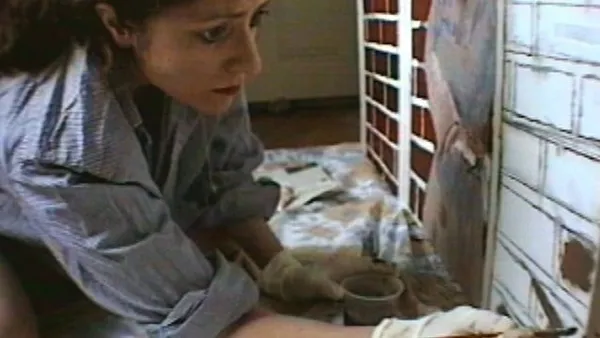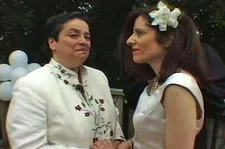 |
| Patricia Livingstone in Blindsided |
Carving out a career in the arts is a already more challenging if one is a woman, and still more so as a lesbian. Add to that the experience of losing one’s sight and hearing and it might seem impossible, but Patricia Livingstone has the kind of creative spirit that it’s impossible to keep down. It’s easy to see why documentarian Lisa Olivieri felt drawn to tell her story. Once she did, it proved to have additional elements that made it much more complex – and more powerful – than she had expected. As preparations were made for the resulting film, Blindsided, to screen at this year’s Scottish Queer International Film Festival, Lisa and I met to discuss how it all came about.
“I met Patricia, I think in like, 1996,” she says. “And when I met her, she was living with Karen. They were friends. And she had told me, I live with my former lover. So I didn't really think anything about it. I just thought, you know, well, people break up, and then they stay together for financial reasons, or whatever. And I didn't think anything of it.”
There was more to the situation than met the eye, however. It wasn’t until Patricia had moved away to live with new partner Bella that Lisa discovered Karen had been abusive towards her.
“So then I went back and re-cut the whole film, because it was just such a huge thing that was missing,” Lisa explains. “And she always told me that there was something she wanted to talk to me about. But she would tell me later, and I didn't even really think of it being anything. So then I started digging through the home footage. And because I wasn't there for their romance, I sort of constructed it through their interviews, and the VHS footage.”
She followed Patricia’s story over eight years in total but the archive footage culled from home movies expands that to almost 20, giving the film tremendous scope. One of the things that’s striking about the finished film is that it’s not just Patricia who discusses the abuse but also Karen, who acknowledges what happened and seems to be trying, in her own way, to make sense of it.
“By the time I found out about it, I had been filming for so many years that I had a relationship with Karen,” says Lisa. “Because when I would film she would be around. And I would film her and Patricia having dinner together or being you know, roommates, because she was in her life. So I felt comfortable asking her why when we interviewed her. My editor and co-producer actually asked the questions. I mean, she knew that I wanted to talk about it. But we kind of did, like, a good cop, bad cop thing.
“So my editor, Laura. actually asked her those very pointed questions. And, you know, if she didn't want to do it, I was not going to finish the film, because it would have been completely one sided. And I don't think it would have been fair to include her and her life and then have somebody talk about her and then her not be able to respond to it.
“You know, domestic abuse is horrible. The fact that she speaks to it, though, is, I mean, I think that it was very kind of her to grant me that. And do that. And it's funny, because when I say that, people have a knee jerk reaction to that. Well, she's a batterer. She's this. People aren't all black and white. And I'm not defending domestic violence in any way, shape or form. But people are complicated. And there's good and bad in everybody.”
 |
| Patricia and Bella's wedding |
“I didn't set out to make a film about domestic violence. I set out to make a film about a woman who was losing her sight and hearing and she was a painter. So my interest was like, how that can happen? How are you going to continue with your artistic journey, or just your art, if you can't see and hear? That was fascinating to me. Because as a filmmaker, if someone said to me - because I shoot my own stuff - you're going to lose your sight and hearing at some point, I that would like scare the shit out of me. And I don't know how I would be able to cope with it. So when the other stuff unfolded, it was just, you know, like, with any documentary, you think you're doing one thing, and all this other stuff comes up, because you're not scripting it and life unfolds.
“So, I mean, it was important for me to talk about because I didn't want to leave it out of the film, and because when Patricia finally told it to me, she started actually dealing with it and processing it and getting help for it. So I thought it would be, you know, it needed to be in there. And it explained a lot of her personality to me.”
We discuss the silence that there sometimes is around domestic abuse within LGBTQ+ communities, and she says that as a straight woman she doesn’t feel that she’s in a position to say anything but that members of the LGBTQ+ community have observed that few films about domestic violence make it to community film festivals “because it's sort of, like, nothing to see here.
“I think that's actually more interesting. The community has, you know, celebrated so much with being able to get married, and then all this other awful stuff is happening. I feel like that should be sort of spotlighted so people know that there's places to go that they can get help. We have resources in Massachusetts specifically for domestic violence between same sex partners. And I think that's important for people to know. I mean, I think it's hard to reach out to ask for help with domestic violence, no matter what your orientation is.
“People don't want to be seen as being weak. People don't want to out their husband or wife. I mean, people keep silent for years. Because they don't want to talk about it. Like, ‘Why don't you leave? Why don't you just leave?’ Well, if it were that easy, everybody would get up and go. But I think what I like about Patricia's story is, what I hope people see is, if there's a woman who is deaf and blind and can't drive, with so much stacked against her - if she can get out, maybe someone who's going through it with more resources can say well, maybe I can.”
I note that despite everything she goes through in the film, Patricia never comes across as weak. Was it her strong personality that first attracted Lisa to her as a subject?
“She attracted me because she's funny. I mean, she has a great sense of humour. She puts Kotex pads on her walls. That is the funniest thing I've ever seen, and it's also brilliant. So when I would go to her house, I would be like, what?”
It was also Patricia’s drive to finish her paintings that appealed to her, she says.
“She's a hard ticket. She's funny, she’s smart. And her and I have remained friends for all these years. We've spent a lot of time together as friends.”
That personality, and the way Lisa captures it, also make what might have been a bleak film very entertaining to watch, I note.
“I'm all about watching a sad tale but I need to have some laughs. Like the film I'm working on now is about women in recovery from different drugs and alcohol, and also, one of the women in the film is trying to get her kids back because they've been taken away because of alcohol use. But the women in the film – I sort of profile or women with overlapping stories - they're funny. If they were all doom and gloom. I couldn't do it. Like, I need to have some humour, even in the darkest of times.”
There are also interesting ideas in the film about what it means to be an artist, beyond communicating through familiar senses.
“Yeah, I mean, I had never really actually thought about it before. It was interesting to me that she was doing it and she was also trying to make a film. And she was composing music on her keyboard, I just couldn't fit all that into the film, and the painting seemed like the natural thing to follow and the heart of it. But yeah, my mind was sort of blow. That was my first experience close up with someone with sight loss trying to do anything like that.”
She comes across as a very creative person in all sorts of different ways within the film.
“She is. I mean, it's like she's the definition of ‘when life gives you lemons make a lemon meringue pie.’ She's got work-arounds for everything. She's very creative. And now she's writing food reviews. She's reviewing restaurants and stuff like that. I mean, she's sort of unstoppable.”
The film screening at SQIFF is exciting, Lisa says, but she wishes that the festival were running in the usual ways as she and her whole family were planning to travel to Scotland. She’s honoured that her film was accepted and would have had fun watching it with the audience.
“You know, it's funny, because I finished the film in 2015. And it aired on TV on PBS but I didn't get a national broadcast. It only aired in Maine overnight, but that's fine. But after the broadcast, I still kept getting into film festivals. So I just kept applying. And that's been sort of kind of mind blowing that the film is five years old and it still gets this, which is great. And then of course, during Domestic Violence Awareness Month, which is in October here, I usually get emails from people asking to see the film to show it to their family violence classes. Social workers use it to train their staff. So the film does get used, which is great.”
It’s also important, I suggest, because it doesn’t reduce Patricia to a victim of abuse, just as it doesn’t reduce her to being deafblind, but it shows these as aspects of a full and complex life. With so much going on in that, was it hard for Lisa to know where to begin when editing?
“At first, when I started piece it together, I was really focused on explaining what Usher Syndrome was, and all this, you know, backstory,” Lisa says. “Then we sort of just started cutting that stuff out, because you just needed to know that it was progressive, it was going to get worse. It was genetic. I mean, of six kids in the family, three of them have it. I didn't want to bog it down with endless doctor's appointments. Because it's like, I don't even want to go to my own doctor's appointment.”
She does follow Patricia’s investigations into getting cochlear implant surgery, however. Although it might be understood differently when the person who wants it is also visually impaired, that’s a controversial subject within the Deaf community. Lisa says that she has no doubt that there are people who think it would have been better for Patricia to remain deaf, but nobody has said that to her. The important thing, she says, is that Patricia is happy and in control of her life today.
“She's doing great.”





















